|
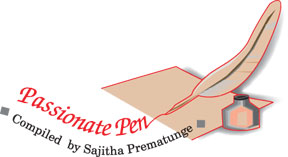
[email protected]
35, D.R. Wijewardene Mawatha, Colombo 10.
A medley of film and literature
by Nilma DOLE
[email protected]
It is certainly not everyday one gets an opportunity to rendezvous
with a BAFTA award winner. More so, when he is the first Sri Lankan to
be bestowed with this prestigious award that stand on the same platform
as those star celebrities only Hollywood knows. However, Asitha
Ameresekere comes across as a storyteller, the down-to-earth type who is
minus the frills.
In fact, he documented his win, winning him Best Short Film for ‘Do
Not Erase’, to BBC online where he says “I don’t know what will happen
tomorrow, but I feel even more confident about continuing to write and
make films. It’s what makes me happiest after all.” Here master
story-teller Asitha Ameresekere born on 24th June 1971 bares his
passionate soul as he flew down from England to launch his book “Wedding
gifts and other stories” at the British Council recently.
Describe your childhood and adolescence.
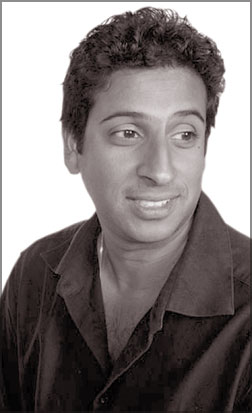
I was born in England and went to primary school there. My family
returned to Sri Lanka and we settled down in Wellawatte. At the time, I
was about 8 or 9 years old and attended the Overseas School in Colombo.
When I was 13, I moved back again to England and studied at the Harrow
School. It was quite an experience to settle down in Sri Lanka and
settling back to England as well. One of my vivid memories is that I
spent 6 months volunteering in a Peruvian shanty town for American
Catholic priests. It was an altogether different way of life and
adapting to it was difficult but so rewarding. It was an eye-opener for
me and I acclimatized as well as I could.
What did you study thereafter?
I read classics at the Bristol University for three years and came to
Sri Lanka soon after to teach English at the British Council. At the
same time, I was trying to get into the film school and this was when I
was accepted into the California Institute of Arts to study for my MFA
(Master of Fine Arts Degree) in theatre, film and Video. Real education
is when you go out and start doing it.
How did the ‘Do Not Erase’ idea come about?
In March 2003, there was this media frenzy with regard to the war on
terrorism. When I was reading the newspapers where British soldiers were
fighting in Iraq and the news about Saddam going to be toppled, there
was this ‘Missing Persons’ column. I was thinking about creating a
connection similar to that of a family but I didn’t want to be biased
about the war.
Hence, my story revolves around this not-so-educated middle-aged
woman, living in the north of England, and her emotions about her son
fighting in this war. When I was writing this story, it took its own
form and that was how it came out as a short film of 29 minutes. ‘Do Not
Erase’ is a story about Annie who sends video diaries to her 19 year-old
son, Darren, who is stationed in Iraq with the British Forces. She keeps
him updated on the news from home and he does too from the battlefield.
However, once Darren goes missing, the video diaries mean much more than
their value on tape.
‘Do Not Erase’ is set against the backdrop of the Iraq conflict,
exploring its impact on an ordinary family in the north of England.
How did you got the inspiration for the other short film you did -
‘In sight’.
‘In sight’ was born after the 9/11 attacks in the US. In the week
that followed, I noticed that people in the tubes and buses in London
were looking at anyone with a dark complexion (including me) with a
certain degree of suspicion. It was this focused perception that is the
central theme of ‘in sight’. The story follows a man who decides to see
things differently and as a result, he hears what people are thinking.
It was my first film and seemed to strike a chord with festival
audiences.
What literature and film scripts are you working on at the moment?
I’m writing two scripts for feature films at the moment. One is a
Mexican production that I co-wrote with a Mexican producer, Gabriela
Isas which has an American-Mexican milieu. The other is a sequel to ‘Do
Not Erase’ and deals with what happens to the family after the loss of
their son and it will be of feature film length.
As for literature, I will return to a novella I wrote some time ago
that is set in Sri Lanka and explores themes of magical realism in the
culture.
We completed another short film - ‘14’ - in March and this is being
screened at festivals currently. This story deals with abuse within a
family.
How are you inspired to write such scripts be it film or story
writing?
I’m interested in nature, how people react to nature and the
different forms of nature. I don’t have really strong emotions about my
work or first-hand experience but it is what I perceive that drives me
to write.
I’m trying to figure what life is all about and I’m trying to
understand how I can put it all together for the outside world to see.
Tell us about your experiences in Sri Lanka and UK.
I was open to my culture and still relish traditional rice and curry
which are my favourite food. It opened my eyes to the different cultures
that moulded me into the person I am today. I have an affinity with my
family as well as my extended family in Sri Lanka. I always valued where
I came from and always kept in touch with my roots.
How come you’ve been so humble in accepting the BAFTA? Your reaction
towards the win was documented by you on BBC online but you seem less
ecstatic than your actors?
I’m really not that kind of guy and it didn’t enter my head that I
was the first Sri Lankan to win a BAFTA. It was an honour that the
industry gave me the recognition because it helps get more films made.
The award gave a lot of perspective to ‘Do Not Erase’ but I was happy
that it won the Skoda Audience Award at the Hamburg International Short
Film Festival 2006 and the Audience Award at the Augsburg International
Film Festival 2007 because it’s the people who like it. I’m a person who
doesn’t rest on my laurels because I have to learn too.
And there’s no risk in re-doing the same thing over and over again.
Will you seek to make a movie to win an Oscar after being the first
Sri Lankan to win a BAFTA?
I’m still a student and I’m still learning about film but I also know
that it is important to have fun making it. I might make a film that
will win something big but I wouldn’t necessarily aim to win an award.
I’d like to explore a wide range of possibilities in the film industry
but I don’t have a message to convey as such. I’d like to talk about
something that people wouldn’t normally hear about and what they’d talk
about afterwards, instead of just forgetting about it.
Describe your recent publication ‘Wedding Presents and Other Stories’
.
The book is a collection of short stories written for friends on
special occasions - weddings, birthdays, etc. They are all inspired by
the tiniest of character traits or glimpses of the recipients, something
that I remember them by. And I wanted to give them a personal gift. I
find I write differently when the story is intended for a specific
person. So the collection is in its published form, that is essentially
giving the reader an insight into these people. Some stories are set in
Sri Lanka, but I do globe-trot in the book, and try to experiment with
different voices and genres. I think there is something for everyone in
there.
What advice would you give would-be storytellers?
It is really important to keep pushing it out because the harder you
struggle with it the more valuable is its creative force.
Reaching a wider audience is good and any artiste should find their
own magic when they reveal their work.n

Magnificent Sigiriya
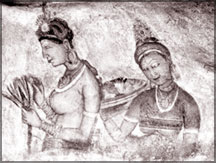
The rock stands in sheer majesty,
Majestic to eye, in all forms, appearance,
Allowing access to man-king generously,
To admire to appreciate and to boast.
How often I came as if in trance to you,
Over and over again unable to shed your spell,
The more I visit more I get entangled intrigued,
Unable to grasp how this spectacle constructed.
The mesmerizing lovely damsles carry flowers,
At their beauty, one can stare on and on,
They smile back all along reigning our hearts,
Able to create universal sensations, being frescoes.
Kassapa! You are great who deserves honour,
Let’s ignore not biker but admire your creativity,
To disparage you, it’s a crime, for you are a hero,
Salutation galore for great your graphic masterpiece.
For you king! No doubt it was also a fortress,
For us of course it’s a leviathan museum,
A bridge that lionizes you links us to you,
Thanks king Kassapa! For endowing magnificent sigiriya.
Radha Ranjani Jayawardana
Die or survive
War,
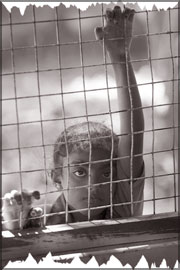
The most destructive course,
They don’t have a clear future,
Beginners let innocent civilians die,
Alas! Thousands of innocent youths.
Is that all?
Children, elders,
From all walks of life,
Oh! Enemies of peace,
Why still your cannibalism?
What’s gone is gone.
Come and surrender,
Peace is right under our nose,
Come and survive,
Why do you die?
Bandula Gunaratne
AFRICA
In GEOGRAPHY

It is where the Nile
And Congo flow,
To HISTORIANS,
Where people
Rose and kings
Slaved through Poverty
Died
In Tribal wars.....
To HUNTERS,
A paradise
For killing and stealing,
For JOURNALISTS, there lies
Hunger, AIDS,
Waiting to be explored.
To ME...you remain
Young, dark,
Wisps of curls,
White teeth,smiling
Out of a glossy page
In a magazine, named
“HOPE”.
Ishani Goonasekara
The ants and the noodle
The ants, at first, they numbered five,
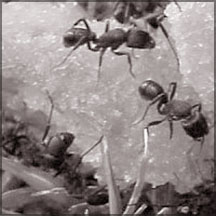
To bear a noodle to their ‘hive’,
Two more joined and danced a jive,
To jerk the efforts come up alive,
Twisted, light and dried, the noodle,
It seemed so like some child’s doodle,
Yet, it wasn’t the seven ants’ ‘poodle’,
Its carriage teased the busy caboodle.
They shoved, they swayed, they pulled each way,
For, each opposed to other said, “Nay”,
And, though begun on April’s day,
The rounds were bound for end of May!
They all tugged and dived and rocked,
Till, straight and stiff, the noodle cocked,
In divers throes the Ants were locked,
‘Las! short of a goal, their tows were docked!
There so grandly, the noodle, it slept,
Where it had been dropped and left,
But, by a broom-stroke swift and deft,
Roughly into a ditch was swept.
Sydney K. Goonesekera

Achebe Defiant and unrelenting
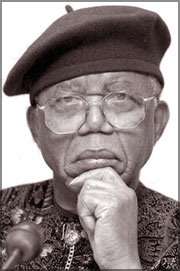 A Nigerian novelist and poet, whose works explore the impact of
European culture on African society, Chinua Achebe, a fine and an astute
social critic, is one of the best known African writers in the West. A Nigerian novelist and poet, whose works explore the impact of
European culture on African society, Chinua Achebe, a fine and an astute
social critic, is one of the best known African writers in the West.
Achebe’s known for his unsentimental, often ironic books, which
vividly convey the traditions and speech of the Ibo people. His first
novel, “Things fall apart”, is one such. This story of a traditional
village ‘big man’ Okonkwo, and his downfall has been translated into
some 50 languages. It depicts the life of Okonkwo, ambitious and
powerful leader of an Igbo community. Okonkwo’s life is all hunky-dory
until he accidentally kills a clansman. But the vehicle for his downfall
is his blindness to circumstances and the missionary church, which
brings with it the new authority of the British District Commissioner.
“Things fall apart” was followed two years later by “No longer at
ease,” and “Arrow of God” (1964), which concerned traditional Igbo life
as it clashed with colonial powers in the form of missionaries and
colonial government. Among Achebe’s later works is “Anthills of the
Savannah” (1987), a polyvocal story with multiple narrators, set in an
imaginary West African state.
“A man of the People” is a satire of corruption, and power struggle
in an African state in the 1960s. “Arrow of God”, set in the 1920s, the
central character being Ezeulu the priest, who sends one of his sons to
missionary school and gains the approval of the English district
superintendent. However, Ezeulu is doomed, because when defending the
traditions of his people he is unyielding, unable to reach a compromise,
and afraid of losing his authority.
Achebe has also written collections of short stories, poetry, and
several books for juvenile readers. His essays include Beware, Soul
Brother, about his experiences during the Civil War. As an essayist
Achebe has gained fame with his collections “Morning yet on creation
day”, “Hopes and impediments” and his long essay “The trouble with
Nigeria”. In “An Image of Africa” Achebe criticizes Conrad’s racism in
Heart of Darkness. He has defended the use of the English language in
the production of African fiction, insisting that the African novelist
has an obligation to educate, and has attacked European critics who have
failed to understand African literature on its own terms.
Achebe’s own literary language is standard English blended with
pidgin, Igbo languages. Achebe shows his skills as a storyteller in “The
Madman” in which the social customs of the Ibo-speaking people are
strongly present.
He has received the 2007 Man Booker International Award, the
Commonwealth Poetry Prize and the New Statesman Jock Campbell Prize.
Achebe has not stopped criticizing post-colonial African leaders who
have pillaged economies. In fact Wole Soyinka had once said: “Achebe
never hesitates to lay blame for the woes of the African continent
squarely where it belongs.”
|
